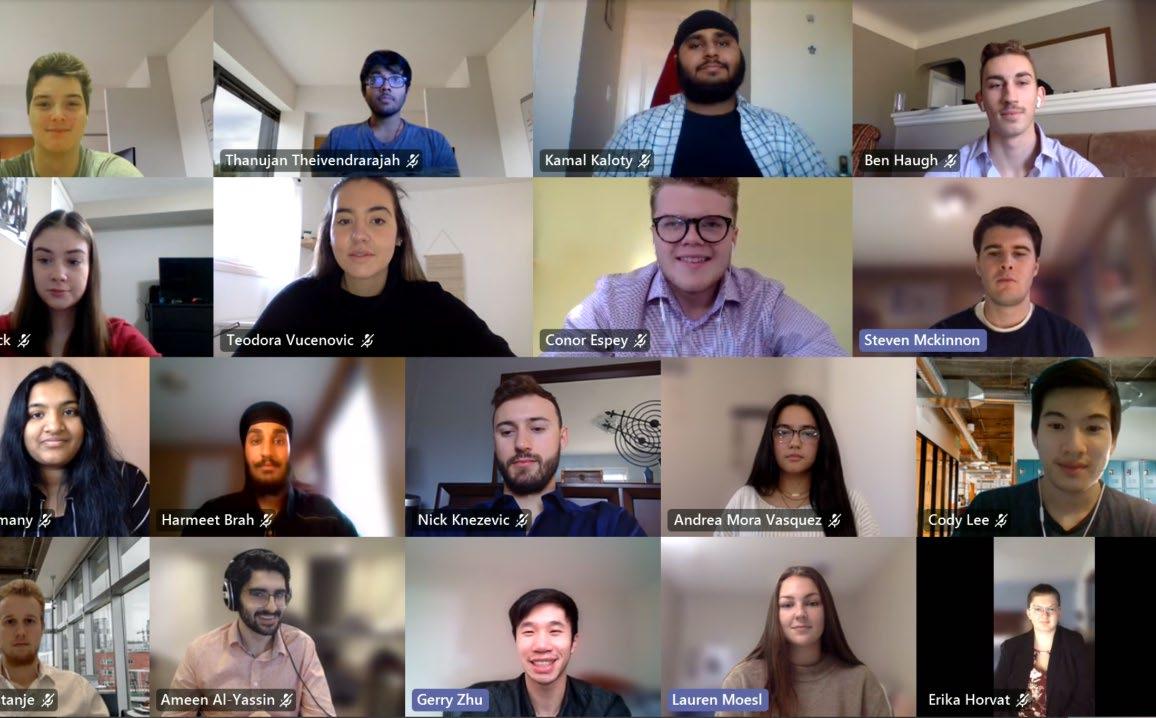
4 minute read
Real Success: How Goodman staff and students persevered in a virtual world
Associate Professor of Marketing Todd Green used music and discussion to engage students and remove barriers sometimes brought on by virtual learning.
By Tiffany Mayer
Pivot was easily a contender for word of the year in 2020. And few had to adjust as quickly and readily to changes brought on by the pandemic as educators. There are many ways Goodman faculty and staff adjusted to the new reality, however, making the Business School a shining example of pandemic-age education. Here are just a few.
CONNECTING OVER A SONG
Todd Green struggled when he switched to online learning in the spring.
The Associate Professor of Marketing was more nervous talking into his laptop than he ever was at the front of his class. He missed the visual cues that students understood what he was saying, or whether they were listening at all.
A few course reviews at the end of the winter term tipped Green off to just how challenging virtual instructing had been for all involved. So when his spring term MBA introductory marketing course started, Green checked in with his students, most of them overseas, and learned how much they missed connecting with each other and their professors.
Green took it upon himself to make virtual lectures as close to interacting IRL as possible by setting aside 10 minutes to talk about anything but school. He’d ask students to post a GIF describing how they felt that day. Sometimes they would talk about their dream jobs or ideal vacations. Next came connecting over a song.
Green, who leads a children’s choir and plays drums, performed solos that inspired students to show off their own musical skills, including singing for each other.
Between the questions and the performances, it removed the barriers brought on by talking into a laptop and helped classmates get to know each other differently.
“I feel like people were more willing to share and open up because other people had sung for them, which is a fairly vulnerable thing,” Green said. “I think it just opened people up to each other.”
A CASE FOR ONLINE COMPETITION
When Mark Rosario took his post as Vice-President Competitions with the Goodman Graduate Business Council (GBC), the MBA student was provided a blueprint from his predecessors for how to run the group’s annual case competition.
But those instructions didn’t help in a pandemic with large gatherings ruled out in the name of public safety.
Rosario and the rest of the GBC decided to reinvent the case competition.

Mark Rosario, Vice-President Competitions with the Goodman Graduate Business Council, reinvented the student club's annual case competition for a virtual environment.
It wouldn’t be easy. Getting participants who were studying at home and across different time zones would be a challenge. So starting last July, the GBC reached out to previous winners, asking them to talk up the benefits of the competition on social media. The group also tapped academic advisers for help marketing the competition to second-year MBA students, who don’t typically participate in large numbers.
In total, 52 students registered for the competition, held at the end of September, nearly matching the 60 participants in 2019. About 20 second-year students participated, too, up from three a year earlier.
Students in St. Catharines were teamed with others in China, India, or those on Pacific Time, and had to navigate the challenges posed by being in different time zones. With a week to work together, 12 teams submitted 10-minute recorded presentations in early October, overcoming everything from time differences, unreliable Internet connections, lighting and home life in the process.
When the competition closed on Oct. 3, both the GBC and competitors were happy with the results. Now Rosario has a new competition blueprint for his successors to use for planning this year’s competition.
“It was a wonderful experience to organize,” he said. “I’m happy it went really smoothly. It was a proud moment when the event came to a close. We pulled it off really well.”
A CO-OP TERM UNLIKE ANY OTHER
The headlines were dire last spring. Co-op students throughout Canada were having a tough time getting placements.
With many parts of the country locked down, work terms shifted online or were cancelled altogether. The hiring cycle for fall work terms loomed and worry set in at Brock and Goodman.
“What we had to ask ourselves was what are we going to do if there were no co-op jobs on the job board,” said Julia Zhu, Associate Director of Co-op Education.
To prevent that, Zhu and her colleagues used a virtual coaching and scouting event called Brock’s Got Talent, which ran from mid-May through to the end of June, to keep students and employers engaged.

Brock's Co-op team led a virtual coaching and scouting event called Brock's Got Talent to keep co-op students and employers engaged through the spring pandemic lockdowns.
About 10 to 15 students participated in each session, doing an elevator pitch and then receiving feedback from employers. It helped students polish their skills while employers saw the talent available for hire. Staff from the co-op office offered advice tailored to each student before making their pitch — something that wouldn’t have been possible at an in-person event.
In the end, the efforts helped Goodman achieve a 93 per cent employment/match rate when hiring happened for September work terms. That bested the national hiring rate of 70 per cent for co-op students.
“You want to keep your leads warm, your employers warm,” Zhu said. “It’s not saying ‘We’re not doing business.’ You also want to keep students engaged. When hiring began, things moved very quickly.”










